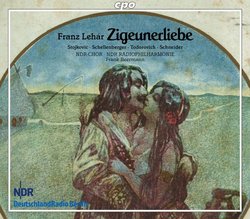| All Artists: Markus Kohler, Franz Lehar, Frank Beermann, NDR Orchestra, NDR Philharmonic Orchestra (Hannover), Dagmar Schellenberger, Johanna Stojkovic, Ksenja Lukic, Raphaela Schulze, Bernhard Schneider, Stefan-Alexander Rankl, Zoran Todorovic Title: Leh�r: Zigeunerliebe Members Wishing: 0 Total Copies: 0 Label: Cpo Records Original Release Date: 1/1/2005 Re-Release Date: 6/21/2005 Genre: Classical Style: Opera & Classical Vocal Number of Discs: 2 SwapaCD Credits: 2 UPC: 761203984220 |
Search - Markus Kohler, Franz Lehar, Frank Beermann :: Leh�r: Zigeunerliebe
CD Details |
CD ReviewsOne of Leh�r's Best, in its First Complete Recording J Scott Morrison | Middlebury VT, USA | 07/14/2005 (5 out of 5 stars) "'Zigeunerliebe' ('Gypsy Love') is possibly the Hungarian composer Franz Lehár's most Hungarian operetta. It takes place in Hungary/Rumania and is replete with lovely and melodic Gypsy music. The plot, simply stated, is about a girl who, though betrothed, dreams of running away with a Gypsy violin player for a life on the road with a band of Gypsies. In the third act she comes to realize that she really wants to have the more settled life already mapped out for her and she returns to her fiancé. This gives Lehár and his librettists Willner and Bodansky an opportunity to present colorful scenes and yet, with the more or less conventional ending, not shock the sensibilities of their 1910 Viennese audience. The operetta has several numbers that have been widely excerpted. The overture sometimes features on orchestral programs. The heroine's czárdás, 'Hör' ich Cymbalklange' ('I Hear the Sounds of the Cimbalom') and the gypsy violinist's aria 'Ich bin ein Zigeunerkind' ('I am a Gypsy child') have been recorded many times by such stars as Anneliese Rothenberger, Joseph Schmidt and Richard Tauber. Also, the duet 'Es liegt in blauen fernen' ('In the blue faraway'), of the heroine, Zorika, and the Gypsy fiddler, Józsi, is fairly well-known. There was a recording of the operetta several decades ago with a starrier cast, but it cut about 20 minutes of music. The present recording contains all the music Lehár wrote for the operetta, but does not include the spoken dialog. For a recording this is certainly acceptable, particularly since long patches of German dialog are probably only acceptable for German-speaking listeners.
The performances are generally quite good. The two leading soprano roles, Zorika and Ilona, sung by Johanna Stojkovic and Dagmar Schellenberger, are very nicely done. Zorika has some passages that are quite dramatic and Stojkovic handles those well. The Gypsy violinist Józsa is sung by Zoran Todorovich who, alas, has not the vocal charm the part calls for (and certainly not the charm of either Schmidt or Tauber), and his high C at the end of his big aria is almost painful. The secondary couple, a pair of very young lovers, sung by Ksenija Lukic and Stefan-Alexander Rankl, are appropriately ardent and naïve. The violin soloist, who plays all of the Józsi's violinistic fireworks, is the talented Andrej Bielow. Two excellent orchestral cimbalom players are featured throughout the score. Conductor Frank Beermann and the NDR Radiophilharmonie play beautifully as if they had been doing this score for years. Overall this is an extremely strong performance -- my only objection is to the charmless and leather-voiced leading man -- and because of its musical completeness it supersedes the rather ancient earlier recording which in any event is no longer in print. This is vintage Lehár, filled with wonderful melodies, and we should be thankful for this carefully prepared and nicely presented issue, part of the cpo label's efforts on behalf of Viennese operetta in general and Lehár in particular. Their issue of his 'Der Rastelbinder' a few months back was a revelation, as it had been banned during the Nazi years because of its positive portrayal of Jewish characters. Recommended for Lehár lovers. 2 CDs TT=119mins. Scott Morrison" |

